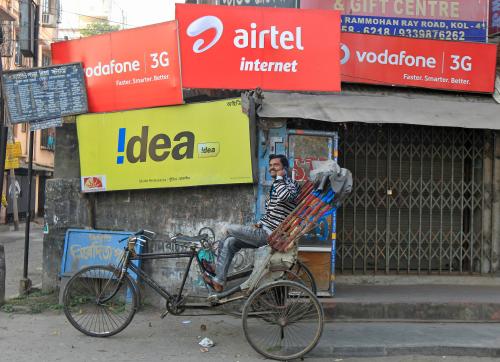A few years ago, Kenyan commercial banks were fighting hard to prevent mobile phone companies from engaging in the business of money transfer. They argued that money transfers were a preserve of banks—thus allowing mobile phone providers to engage in them was in violation of the Banking Act. The banks lost this fight. However, as banks have recently begun to tap into the mobile banking industry themselves, the mobile phone providers are now pressuring politicians to stop the banks from entering the mobile banking systems purely on their own.
The Fight Against Mobile Banking
Between 2007 and 2008, then-acting Minister of Finance John Michuki was increasingly leaning towards an over-regulated banking regime that would have seriously handicapped the expansion of Safaricom’s M-Pesa money transfer program as we know it today. In fact, Michuki ordered a probe of the mobile money transfer system because it was alleged that it posed dangers to the financial system—a decision possibly “influenced by an informal cartel of local banks unhappy with the threat Safaricom’s mobile money transfer service poses to their business.” The Kenyan newspaper The Star even found “well-placed sources” reporting that four big local banks actually created an “ad hoc committee” designed to stop M-Pesa. The banks apparently approached Michuki in late 2008, alleging that M-Pesa was similar to a “pyramid scheme” and that “people could lose their money if it collapsed.” On this prompt, says The Star, Michuki ordered the Central Bank of Kenya to audit M-Pesa—reasoning that the service’s popularity had made the government “jittery.” He even stated, “I am not sure M-Pesa is going to end well.”
Michuki was not the only official approached: The governor of the Central Bank of Kenya, Prof. Njuguna Ndung’u, has asserted that he turned down a plea from commercial banks’ chief executives in 2007 to stop the spread of mobile money service M-Pesa. According to the governor, some commercial banks’ CEOs approached him, “complaining that M-Pesa, offered by Safaricom, would cause a financial crisis in the country.”
Had the technocrats (the non-political experts in government) sided with the commercial banks and political elements, this intense lobbying would have cost the country a great opportunity—one that has turned Kenya into a leading example of an innovative approach to increasing financial inclusion in the world. To be sure, the credit for effectively opposing the lobbying efforts by commercial banks is shared—the Central Bank of Kenya (especially its regulatory and payments systems departments), the Communications Commission of Kenya, and notably also the then-permanent secretary of the Ministry of Information and Communications, Bitange Demo, who made a strong case for licensing mobile banking. These officials clearly understood the political economy of private interests seeking to erect political barriers to entry, the consequences of which would have been large welfare losses to society at large while concentrating benefits among the few.
Now the tables have turned. After the phenomenal success of mobile banking, which clearly threatened the profitability of traditional banking models, commercial banks changed their operations and began to invest in mobile phone-based banking. They started by introducing products that linked to the services offered by the mobile phone companies. Today, commercial banks have ratcheted up their operations to full mobile banking including introducing their own SIM cards instead of relying on those issued by the mobile phone providers. Now, mobile phone operators are crying foul and seeking political cover with the intention of barring such operations. They claim that this is an issue of security: Equity’s thin SIM technology could expose its users to financial fraud. These complaints are just another attempt to create barriers to entry in order to reduce competition, just from the other side.
The New Fight: Safaricom Versus Equity Bank
Equity Bank and Safaricom are some of the best managed, innovative and successful companies in Africa. Both headquartered in Kenya, they are leaders in their core businesses—Equity in banking and Safaricom in mobile telephony and mobile banking. They have coexisted in harmony and, in the past, Equity has even sought to backpack on Safaricom’s success by introducing products that tap on M-Pesa, thus benefiting both the mobile phone company (in expanding its business) and also increasing Equity’s profitability and customer base. Thus, by and large, they have coexisted harmoniously. Until now.
Recently, Equity Bank has introduced new technology that uses an independent SIM card (one not issued by a mobile phone company). This paper-thin SIM card is layered on top of a customer’s existing card without affecting the customer’s original service provider’s network reception. With this SIM card, customers need not change to dual SIM card handsets, and they can make calls, send messages and transfer funds from the same phone. In September 2014, the Communications Authority of Kenya gave Equity Bank a license to use the technology. Safaricom has come out strongly in opposition to the introduction of the new technology, arguing that it puts users at risk of fraud and that the approval was granted before full legislation was enacted. Just as commercial banks had done when their core business was threatened by mobile phone service providers, Safaricom has sought protection from politicians—who have now recommended that Equity’s approval be suspended until they are satisfied with the security of the technology.
Commercial banks venturing directly to provide services that are the domain of the mobile phone providers introduce a new margin of competition that is a real threat to the profitability of mobile phone services providers. Thus Safaricom is now seeking to erect political barriers to entry while disguising it as a concern over safety. As one analyst in The Economist has noted, “This is a classic incumbent move, claiming safety concerns to try and prevent Equity Bank offering value-added services that Safaricom offer through M-Pesa.”
The Legislation of Innovation
As demonstrated by these tussles, one of the dangers of innovation in financial service provision is that the appropriate legislation lags behind the innovation. In a 2009 study on the success of mobile banking in Kenya, Ndung’u and I note that there are two major policy options when approaching this issue. The first is to bar the products until legislation has been passed. We also note, however, that “given that most often the process of enacting legislation takes a long time, such an approach risks the possibility of stifling innovation and thus undermining access.” On the other hand, an alternative could be to enact legislation after the products have entered the market, but, again, we note that “this approach would achieve the goal of access but could associate with financial instability.”
Kenya has somewhat followed the second approach, as we explain in our paper: “In Kenya, the strategic policy choice has been to allow technological innovations in mobile banking, but under prudent monitoring and review to ensure that the integrity of the financial system is maintained. … At the institutional level, the Central Bank of Kenya has undertaken various strategies to enhance the oversight capacity effectively keeping abreast of innovation and technologically driven financial services. This has made it possible to increase access to financial services but at the same time maintain stability.”
Clearly, mobile banking innovation should be encouraged to thrive, but watched closely by the relevant authorities, who should prioritize balancing access and stability. We emphasize that “it would be extremely unwise to expand access at the expense of financial stability and integrity of the payment system. Countries that do not have adequate supervisory capacity of their payment system would be ill advised to allow new technologically-driven financial products and should carefully weigh the potential costs of instability. Some vulnerabilities of mobile phone banking that can destabilize the financial system and lower the efficiency of the payment system include fraudulent movement of funds, network hitches, mismatch of cash balances at the pay points, and problems that associate with high velocity of funds making it difficult to stop suspect transactions.”
Thus, the key to Kenya’s successful mobile banking industry is permitting innovations and, at the same time, ensuring that the regulatory agencies work continuously to evaluate and manage potential risks. This is what the authorities are doing by allowing the commercial banks to enter the market. It is also a major reason mobile banking has been so successful in Kenya and not in many other African countries.
The technocrats have already evaluated the Equity Bank’s technology and are convinced that it is secure. Such innovations are crucial to advancing welfare and erecting barriers to entry in the name of security will only serve to undermine innovations and reduce consumer welfare. Politicians should be careful not to undermine competition as is evident in the current case of Equity versus Safaricom. Incumbent and dominant firms like Safaricom must brace for increased competition arising from technological innovations, and the best strategy for them to keep ahead of entrants is investing in innovation so as to be able to provide more, better and cheaper services.






Commentary
Mobile Wars and Political Barriers to Entry: Safaricom vs. Equity Bank
October 29, 2014